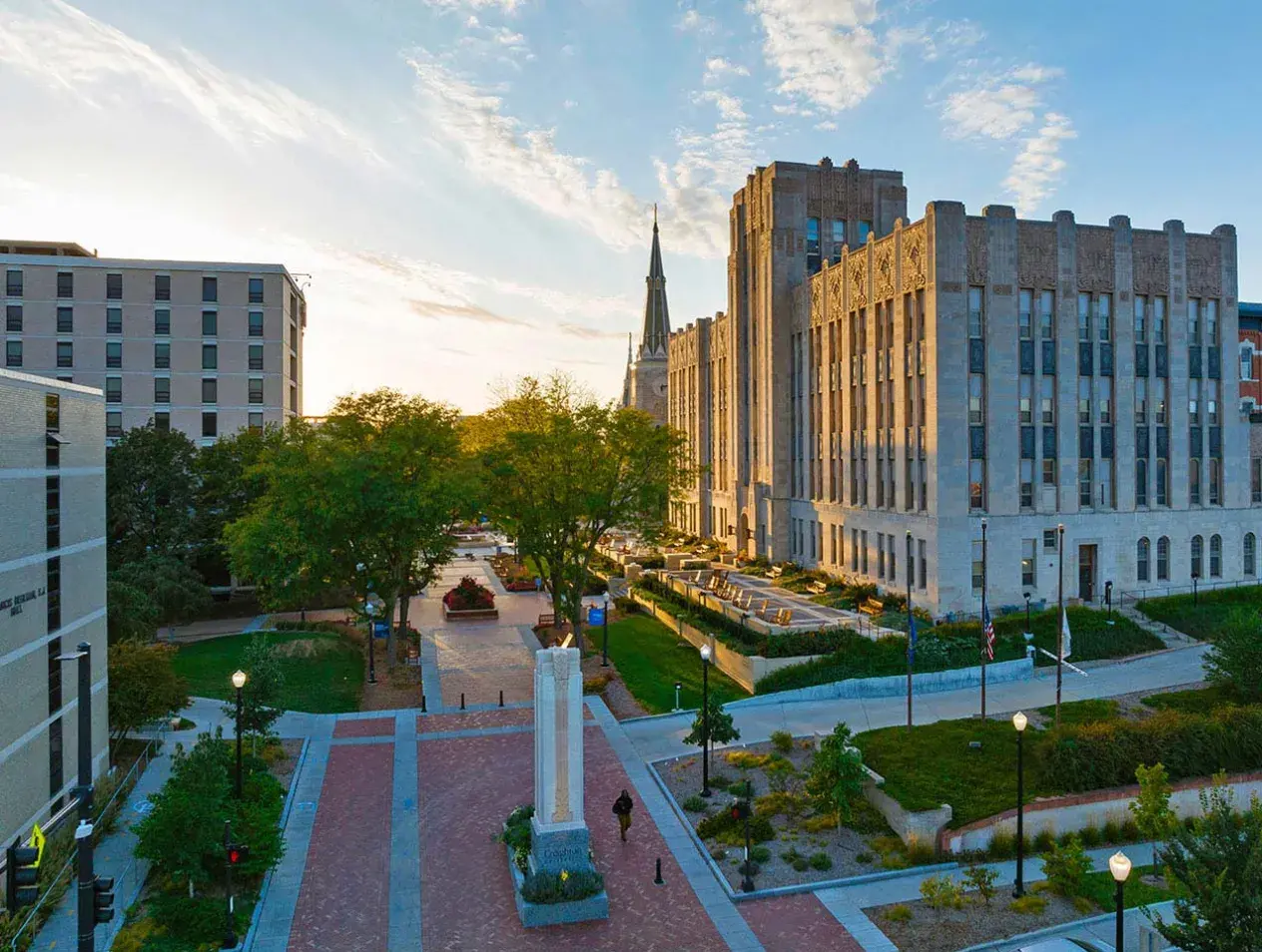
Institutional Biosafety Committee
It is the policy of Creighton University that any possession of and/or activity involving known or potential biohazardous materials be reviewed and approved by the Institutional Biosafety Committee. Biohazardous materials subject to review by the IBC include, but are not limited, to the following:
Infectious Biological Agents
Infectious biological agents and biologically derived materials that present a risk or potential risk to the health of humans or animals, either directly through infection or indirectly through damage to the environment. Infectious agents have the ability to replicate and give rise to potentially large populations in nature when small numbers are released from controlled situations.
Recombinant DNA
The NIH Guidelines define Recombinant DNA molecules as either (i) molecules that are constructed outside living cells by joining natural or synthetic DNA segments to DNA molecules that can replicate in a living cell, or (ii) molecules that result from the replication of those described in (i) above. In addition, synthetic DNA segments that are likely to yield a potentially harmful polynucleotide or polypeptide (e.g., a toxin or a pharmacologically active agent) are considered as equivalent to their natural DNA counterpart.
Select Agents
By law, Creighton University must report all specified biological "select agents" in its possession to the government. These "select agents" are identified on the lists provided on the right by the CDC and USDA.
This policy applies to activity and research that is sponsored by the University; conducted by faculty, staff, students, or agents of the University; or conducted using the University's property, facilities, or non-public information.
Michael A. Belshan, PhD
Chair, Institutional Biosafety Committee
Professor, School of Medicine
Member (Voting), Scientist, Affiliated
Richard Goering, PhD
Vice Chair, Institutional Biosafety Committee
Professor, School of Medicine
Member (Voting), Scientist, Affiliated
John Baxter
Director, Environmental Health and Safety
Member (Voting), Biosafety Officer, Scientist, Affiliated
Charles Brockhouse, PhD
Associate Professor, College of Arts and Sciences
Member (Voting), Scientist, Affiliated
Rima El-Herte, PhD
Clinical Assistant Professor, School of Medicine
Member (Voting), Scientist, Affiliated
Stacey Morrow, MS, MT(ASCP)(Certified Medical Technologist)
Associate Director, Molecular Biology, Creighton Center for Antimicrobial Research and Epidemiology
Member (Voting), Scientist, Affiliated
Aurijit Sarkar, PhD
Associate Professor, School of Pharmacy & Health Professions
Member (Voting), Scientist, Affiliated
Nicholas Streck, PhD, D(ABMM)
Assistant Professor, School of Medicine
Member (Voting), Scientist, Affiliated
Marisa Zallocchi, PhD
Assistant Professor, School of Medicine
Member (Voting), Scientist, Affiliated
Graham Cox, PhD
Community Representative, Animal Expert
Member (Voting), Scientist, Unaffiliated
Christopher Austin, MS, MPH
Community Representative
Member (Voting), Scientist, Unaffiliated
Joseph A. Knezetic
Director of Research Compliance
Phone: 402.280.2511
Fax: 402.280.4766
Email: joek@creighton.edu
Shannon Walsh
Research Compliance Quality Assurance Auditor
Phone: 402.280.2322
Email: shannonwalsh@creighton.edu
Teri Prentis
IBC Administrator
Phone: 402.280.2126
Email: IBC@creighton.edu or teriprentis@creighton.edu
Schedule of Meetings
The Institutional Biosafety Committee will meet as needed. All meetings will be held in the Research and Compliance Conference Room, Criss I, Room 111, at 2 PM on the second Friday of the month.
Meeting dates are subject to change.
To confirm a meeting date, contact the IBC Administrator at 402.280.2126 or IBC@creighton.edu.
The IBC Policies and Procedures for the Use of Biohazardous Materials (IBC Policies) outlines the processes that must be followed when obtaining, using, storing, transferring, or destroying biohazardous materials, and provides a review of the relevant regulatory requirements. Since laboratory work can involve exposure not only to biohazardous materials, but also to chemical and radiological hazards, these policies should be used in conjunction with any pertinent University manuals (e.g., the Investigators' Manual for Laboratory Safety, the Users' Manual for Radioactive Materials).
- Biosafety in Microbiological and Biomedical Laboratories (BMBL) 5th edition (U.S. Department of Health and Human Services, Public Health Service, Centers for Disease Control and Prevention, National Institutes of Health)
- Bloodborne Pathogens 29 CFR 1910.1030 (Occupational Safety and Health Administration )
- NIH Guidelines for Research Involving Recombinant DNA Molecules (National Institute of Health; PDF document)
- Select Agents and Toxins 42 CFR Part 73 (US Department of Health and Human Services)
- Possession, Use, and Transfer of Select Agents and Toxins 7 CFR Part 331 (US Department of Agriculture)
- Etiologic Agent Import Permit Program (Centers for Disease Control and Prevention)
Creighton University's Institutional Biosafety Committee uses the CITI Biosafety/Biosecurity training course for anyone conducting research involving biohazardous material, including Infectious Biological Agents, Recombinant DNA and Select Agents. All Principal Investigators, Co-Investigators, Laboratory Technicians, and Research Staff involved in research using biohazardous material in their laboratories are required to complete assigned training. "Research Staff" refers to anyone, including students of any kind, conducting research on or otherwise handling biohazardous material, including Infectious Biological Agents, Recombinant DNA, and Select Agents.
Creighton InfoEd Global for IBC
Instructions for accessing InfoEd and locating registration records.
Instructions for creating an IBC registration and other submission types.


